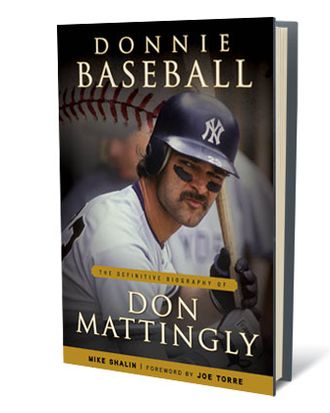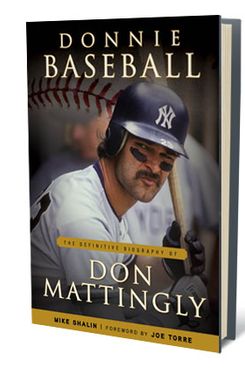

Don Mattingly played in 1,785 games during his fourteen-year big-league career — all for the Yankees — then later served on Joe Torre’s coaching staff in both New York and Los Angeles. But next week, he’ll begin his managerial career when the Dodgers open their season against the defending-champion Giants. In Donnie Baseball, writer Mike Shalin — who covered the Yankees for the Post for two years before spending the next 22 at the Boston Herald — chronicles Mattingly’s career, from his hometown of Evansville, Indiana, to the Bronx, and eventually to Los Angeles. (Shalin, writing in the book’s introduction, aptly describes the book as something of “an ode to Don Mattingly.”) Shalin spoke with The Sports Section about Mattingly’s bad back, his Hall of Fame credentials, and whether New York fans would ever boo Mattingly if he managed the Yankees one day.
It’s suggested in the book that all the extra swings Mattingly put in during his career might have contributed to his back troubles later on. How much stock do you put in that suggestion?
Well, first of all, I think that had he had the back problems he had then, had he had them now, I think that training and medicine and everything else would have helped him. You hear about a lot of guys with knee surgeries back then that would have played a lot longer had it been for the wonder of arthroscopic surgery. So, I wonder if that would have helped him. As far as how much did it contribute, all we can do is speculate, but the guy worked so hard, for anybody who watched him during his career, he was just tireless at it. And that was the only way that he knew. And had somebody told him to cut back at the time, would he have? I have a feeling that they did tell him, and it didn’t really matter. He just wanted to keep working.
Why do you think Stump Merrill ordering him to cut his hair before a game set Mattingly off like it did? After all, it’s not exactly a matter of respect, in the way that being called out in the press by George Steinbrenner was.
I think he was insulted by the way it was done. He makes it pretty clear that had Stump come to him and said, “Get a haircut by Friday, please, and let’s not make this a big deal,” I don’t think it would have been a big deal. I think he would have cut his hair. But the fact that they basically came to him before the game and said, “Cut your hair before the game or you’re not playing,” kind of drew a line in the sand, and Mattingly was a prideful guy. He viewed himself as somebody who never caused a problem. In other words, it’s almost like, you’ve got three kids, and one of them is really, really well behaved. And he gets blamed for stuff the two kids who aren’t did. That would obviously affect the good kid, if you want to say it that way.
Before that even happened, though, he’d discussed the possibility of being traded with Gene Michael. Why would he do that, at that point in time?
I think he perceived that — he never mentioned Gene Michael by name — but I think he didn’t like the way things were going, and in the heat of the moment, or the heat of what was going on that year, he went ahead and said, “Go ahead and trade me.” And Stick had no plans to trade him. From the time free agency started through the middle of that decade — in other words, you’re talking about a period of almost two decades — everything was chaotic with the Yankees. That’s just the way it was. I covered the team for two years, and I can’t tell you how many times somebody said, “I gotta get out of here. I can’t take this.” Sometimes push comes to shove and you just say something. Whether you actually mean it or not are two different things, because things get said in anger.
How was Mattingly’s relationship with Michael. After all, Michael often gets a lot of credit for the success of the Yankees teams in the late nineties?
I honestly don’t know that. I know both of them, but I didn’t talk to Gene for the book. I wasn’t able to get in touch with him; I wish I could have. I got the impression from Donnie that he really admired what Stick did to turn things around there, and gives him a lot of credit for it.
But did he think that at the time that he was asking Michael to explore a trade, that Michael had a plan? Or is that said in hindsight?
No, I think it’s something that evolved over time.
Mattingly was, and is, a very popular Yankee. And when he was up for the managerial job a few years ago, it struck me that one of the considerations with hiring Don Mattingly to manage the Yankees is that there could come a point when the Yankees would have to fire Don Mattingly, and that could be an ugly situation. Did he or the Yankees ever give any thought to that?
I think there’s something to that. I think that he felt that had George still been in control — there’s quotes in there about the meeting during the interview process, that George was in the room, but really wasn’t — but he thought, and others have told me the same thing, that had George been really the person who was doing the hiring, then Donnie would have gotten the job. Whether or not that’s the right decision or not, I don’t know. The future will tell us what kind of manager Don Mattingly is, and it’ll come down to what it always comes down to, and that’s the players.
Look at the situation they were in with Jeter in the offseason, where you talk about not firing Don Mattingly, how about not signing Derek Jeter? They may have sat in a room and said, you know what, why are we throwing all this money at Jeter? And the only logical answer to that question was that it’s Jeter. And as long as he has something left, Jeter has to be a Yankee. And I think that’s kind of what you’re talking about. Those two things kind of connect in a way because I think that Mattingly was an earlier version of Jeter, just without the championship rings.
Right, but eventually Jeter will be too old to play. Managers, though, can go on more or less indefinitely, unless one party or the other wants to end it. At some point, they might have to make the decision to cut ties with him. Was that ever a consideration when discussing whether to bring in someone so popular?
I don’t know; I think they run a business. And they went with a manager with experience. Joe Girardi was the National League manager of the year. I think when it comes right down to it, they might be difficult decisions, but these guys know they have to make business decisions, and when the time comes, certain moves have to be made. I’ll tell you another thing, too. If Donnie was struggling as the Yankee manager — there’s a part of the book where people talk about how they never heard Mattingly get booed — I guarantee you if the Yankees were losing, Mattingly would get booed, and then it wouldn’t be as difficult a decision. You gotta remember, too, in ‘08, when Girardi got the job, that’s 25 years from the day that Don came up. So there’s a large section of Yankee fans that didn’t know him as Don Mattingly, the player. So I don’t think it entered into their decision, is the best way to put it.
You have a Hall of Fame vote. Do you vote for Mattingly?
Yes. In fact, I didn’t early on. I wrote a book with my brother called Out By a Step: The 100 Best Players Not in the Baseball Hall of Fame, and we ranked 100 guys who aren’t in, and we explained the reasons why they’re not in. With Don, I don’t know if it’s the steroid era that has gotten me to appreciate him more, which is one of the reasons people think that Jim Rice got in. But if you match his numbers up, I’ve kind of taken up a new perspective on the Hall, and that is in some cases, if you’re the dominating player at your position, or of the game, for five or six years, you’re a Hall of Famer.
A lot of people go by cumulative numbers, and I know that Don Mattingly was a better baseball player than a decent number of players who are in, if that makes any sense. It’s just like in the book, we talk about Tony Oliva. And I was a Harmon Killebrew fan when I was a kid, but never for one day was Harmon Killebrew a better baseball player than Tony Oliva. He hit a lot of home runs, he had the endurance, he stuck around, but it’s just like in Pittsburgh: Dave Parker was a better baseball player than Willie Stargell. And in a lot of ways, Dave Parker was the best player that I’ve ever seen, because of the fact that he was six foot five, six foot six, and could do the things that he could do. So when I started analyzing it that way, his numbers compared to a Kirby Puckett matched up very well. And he was just a dominating player for that period in the eighties. I tell people, I started voting for him before I got this assignment to do this book. Throw in the defense, throw in the leadership qualities, whatever you want to throw in. I just think Don Mattingly was a Hall of Famer.
Anything else you’d like to add?
You didn’t ask the one question everybody’s been asking, which I appreciate, by the way.
What’s that?
The question I always get is, What’s a guy from Boston doing writing a book about Don Mattingly?
What’s the answer you give? You did cover the Yankees for a time, right?
Yeah, I was there when he came up, got to know him a little bit as a visiting player. Always had a nice relationship with him, and I got a tip that Triumph Books was looking for someone to do a book on Mattingly. So I sent out an e-mail, and we started going back and forth, and we did the contract like three days before the Dodgers came into Boston last year. And I went into the clubhouse, I went in to see Torre, and he agreed to do the forward. Then I waited for Donnie, we renewed our “Hi, how ya doin’s,” and I said I’m writing a complimentary book about you whether you help me with it or not, and he just looked at me and said, “What do you need?” He had no interest in it being an authorized biography, or an autobiography. He didn’t want to do a book. But he trusted me to do this, and we sat for several hours of interviews, and as you’ve seen, there’s a lot of him in the book, even though it’s not an autobiography. And that’s basically how it happened.